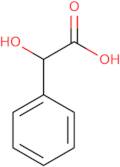2-Hydroxy-2-phenylacetic acid
CAS: 611-72-3
Rif. 3D-AAA61172
| 1kg | Fuori produzione | ||
| 50g | Fuori produzione | ||
| 100g | Fuori produzione | ||
| 250g | Fuori produzione | ||
| 500g | Fuori produzione |
Informazioni sul prodotto
- (+/-)-Alpha-Hydroxyphenylacetic Acid
- (R)(S)-Mandelicacid
- (RS)-2-Hydroxy-2-phenylacetic acid
- (RS)-Mandelic acid
- (±)-2-Hydroxy-2-phenylethanoic acid
- (±)-α-Hydroxybenzeneacetic acid
- (±)-α-Hydroxyphenylacetic acid
- 2-Phenyl-2-hydroxyacetic acid
- 2-Phenylglycolic acid
- <span class="text-smallcaps">DL</span>-Amygdalic acid
- Vedi altri sinonimi
- <span class="text-smallcaps">DL</span>-Hydroxy(phenyl)acetic acid
- <span class="text-smallcaps">DL</span>-Mandelic acid
- Almond acid
- Amygdalic acid
- Benzeneacetic acid, α-hydroxy-
- Benzeneaceticacid,Alpha-Hydroxy-,(+-)-
- Cyclandelate,Pemoline
- DL-mandelate acid
- Dl-Mandelic Acid Free Acid
- Dl-Mandelicacid
- Mandelic Acid
- NSC 7925
- Paramandelic acid
- Phenylglycolic acid
- Phenylhydroxyacetic acid
- S 14-75781
- Uromaline
- α-Hydroxy-α-toluic acid
2-Hydroxy-2-phenylacetic acid is an organic compound that is used in the synthesis of the drug ketoconazole. It is a mandelic acid derivative that has been shown to have anti-inflammatory properties, which may be due to its ability to inhibit the production of prostaglandins. This reaction occurs by competitive inhibition of the enzyme cyclooxygenase, which is required for prostaglandin synthesis. 2-Hydroxy-2-phenylacetic acid also has been shown to be a ligand for toll-like receptor 4 and induce endotoxic shock in mice, making it a potential treatment for hyperproliferative diseases such as psoriasis and cancer.





